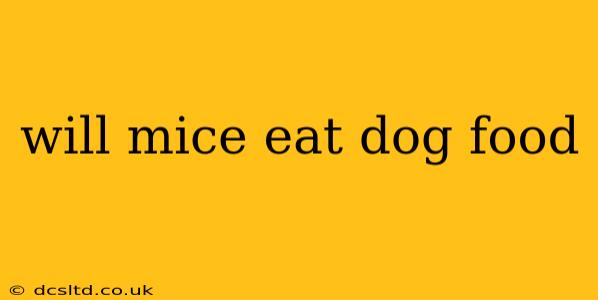Will Mice Eat Dog Food? A Comprehensive Look at Rodent Diets
Mice, those tiny, often unwelcome houseguests, are surprisingly opportunistic eaters. While they prefer certain foods, the question of whether they'll eat dog food is a definite yes, but with important nuances. This article delves into the details, exploring why mice might choose dog kibble, what other foods attract them, and how to prevent these furry intruders from raiding your pet's food.
Why Would a Mouse Eat Dog Food?
Mice are omnivores, meaning their diet consists of both plant and animal matter. Their primary food source in the wild often includes seeds, grains, and insects. However, when access to these preferred foods is limited—which is often the case inside a house—they become much less picky. Dog food, with its high protein and carbohydrate content, represents a readily available, calorie-rich option. The smell and easily accessible nature of dog kibble often makes it a tempting target.
What Other Foods Attract Mice?
While dog food is certainly appealing, mice aren't particularly discerning eaters. Knowing what else attracts them is crucial for effective rodent control. They're drawn to:
- Crumbs and spills: Even tiny crumbs left on counters or floors are irresistible.
- Pet food: This isn't limited to dog food; cat food, birdseed, and even fish food are all potential attractants.
- Stored food: Pantry staples like grains, cereals, nuts, and dried fruits are prime targets.
- Garbage: Improperly stored garbage is a significant source of food and shelter for mice.
- Grease and oily residue: Mice are drawn to the smell of grease and oil, often found on cooking surfaces and appliances.
What about specific types of dog food?
The type of dog food doesn't significantly impact whether or not a mouse will eat it. Dry kibble is the most accessible, but mice will also consume wet dog food if given the opportunity. The primary factors are accessibility and the food's overall nutritional appeal.
How can I prevent mice from eating my dog's food?
Preventing mice from accessing dog food is key to rodent control. Here are some effective strategies:
- Store dog food in airtight containers: This eliminates the smell and prevents access.
- Clean up spills immediately: Don't leave any food scraps lying around.
- Regularly clean feeding areas: Remove any old food or debris.
- Seal cracks and holes: Mice can squeeze through incredibly small spaces, so sealing entry points is vital.
- Use traps or repellents: Consult with pest control professionals for effective solutions.
Are there any health risks associated with mice eating dog food?
While mice can survive on dog food, it isn't ideal nutritionally. A diet solely consisting of dog food might lack crucial nutrients, leading to potential health problems for the mice. Furthermore, the potential for disease transmission between mice and pets should not be underestimated. Maintaining good hygiene and preventing rodent infestations is important for both pet and human health.
In conclusion, yes, mice will readily eat dog food, given the opportunity. Understanding their dietary preferences and taking preventative measures are crucial for controlling rodent infestations and protecting your pet's food. Remember, a multi-pronged approach involving food storage, cleanliness, and habitat modification is the most effective way to keep your home mouse-free.
